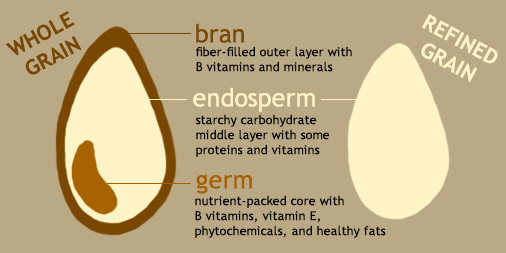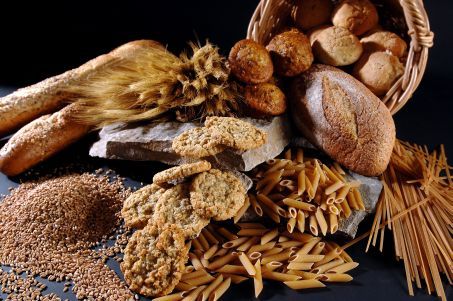One of the Cancer Prevention Recommendations is to make whole grains (eg brown rice, wheats, oats, barley and rye) a major part of our usual daily diet. © Copyright World Cancer Research Fund (WCRF), 2018. All Rights Reserved. Only for information after permission of the WCRF. For more, here their link:
https://www.wcrf.org/dietandcancer/recommendations/wholegrains-veg-fruit-beans
Naturally, the whole grain is more nutritious that the refined one and contains all these parts, here a picture (Harvard School of Public Health):

The refined grain contains only the endosperm, without bran and germ (loss of valuable nutrients in the refining process). With refined grains, we end up eating more to feel satiated, but with less nutrients.
There is a strong scientific evidence, see all studies at the bottom of this page, that eating foods containing dietary fibre protects against colorectal cancer and against weight gain, overweight and obesity.
Eat at least 30g of fibre per day. The fibre content stronlgy depends on the type of grain (for more, you can search in free online up-to-dated USDA Food Composition Database at FoodData Central selecting “Nutrients: Fiber, total dietary(g)”.
Foods containing dietary fibre are plant-based carbohydrates that, unlike other carbohydrates (such as sugars and starch), are not digested in the small intestin. Here an example of food containing dietary fibers: breakfast cereals, pasta, bread, oats, barley, rye, but also fruit (such as berries, pears and melon), vegetables (such as broccoli, carrots and sweetcorn), also in peas, beans, pulses, nuts and seeds.
It’s essential that the whole grain products are farmed in a biological way (bio, organic).
Here the scientific studies from www.ilcibodellasalute.com by Silvia Petruzzelli:
* Nettleton JA, Steffen LM, Loehr LR, Rosamond WD, Folsom AR. Incident heart failure is associated with lower whole-grain intake and greater high-fat dairy and egg intake in the Atherosclerosis Risk in Communities (ARIC) study. J Am Diet Assoc. 2008;108(11): 1881-1887.
* Schatzkin A, Park Y, Leitzmann MF, Hollenbeck AR, Cross AJ. Prospective Study of Dietary Fiber, Whole Grain Foods, and Small Intestinal Cancer. Gastroenterology. 2008; 135:1163-1167.
* Chan JM, Wang F, Holly EA. Whole grains and risk of pancreatic cancer in a large population-based case-control study in the San Francisco Bay Area, California. Am J Epidemiol. 2007;166(10):1174-1185.
* de Munter JS, Hu FB, Spiegelman D, Franz M, van Dam RM. Whole grain, bran, and germ intake and risk of type 2 diabetes: a prospective cohort study and systematic review. PLoS Med. 2007;4(8):e261.
*Djousse L, Gaziano JM. Breakfast cereals and risk of heart failure in the physicians’ health study I. Arch Intern Med. 2007;167(19):2080-2085.
* Jacobs DR, Jr., Andersen LF, Blomhoff R. Whole-grain consumption is associated with a reduced risk of noncardiovascular, noncancer death attributed to inflammatory diseases in the Iowa Women’s Health Study. Am J Clin Nutr. 2007;85(6):1606-1614.
* Schatzkin A, Mouw T, Park Y, Subar AF, Kipnis V, Hollenbeck A, Leitzmann MF, Thompson FE. Dietary fiber and whole-grain consumption in relation to colorectal cancer in the NIH-AARP Diet and Health Study. Am J Clin Nutr. 2007;85(5):1353-1360.
* Merchant AT, Pitiphat W, Franz M, Joshipura KJ. Whole-grain and fiber intakes and periodontitis risk in men. Am J Clin Nutr. 2006;83(6):1395-1400.
* Sahyoun NR, Jacques PF, Zhang XL, Juan W, McKeown NM. Whole-grain intake is inversely associated with the metabolic syndrome and mortality in older adults. Am J Clin Nutr. 2006;83(1):124-131.
* van Dam RM, Hu FB, Rosenberg L, Krishnan S, Palmer JR. Dietary calcium and magnesium, major food sources, and risk of type 2 diabetes in U.S. black women. Diabetes Care. 2006;29(10):2238-2243.
Esmaillzadeh A, Mirmiran P, Azizi F. Whole-grain consumption and the metabolic syndrome: a favorable association in Tehranian adults. Eur J Clin Nutr. 2005;59(3):353-362.
Larsson SC, Giovannucci E, Bergkvist L, Wolk A. Whole grain consumption and risk of colorectal cancer: a population-based cohort of 60,000 women. Br J Cancer. 2005;92(9):1803-1807.
Jensen MK, Koh-Banerjee P, Hu FB, Franz M, Sampson L, Gronbaek M, Rimm EB. Intakes of whole grains, bran, and germ and the risk of coronary heart disease in men. Am J Clin Nutr. 2004;80(6):1492-1499.
Slattery ML, Curtin KP, Edwards SL, Schaffer DM. Plant foods, fiber, and rectal cancer. Am J Clin Nutr. 2004;79(2):274-281.
* Good CK, Holschuh N, Albertson AM, Eldridge AL. Whole grain consumption and body mass index in adult women: an analysis of NHANES 1999-2000 and the USDA pyramid servings database. J Am Coll Nutr. 2008;27(1):80-87

